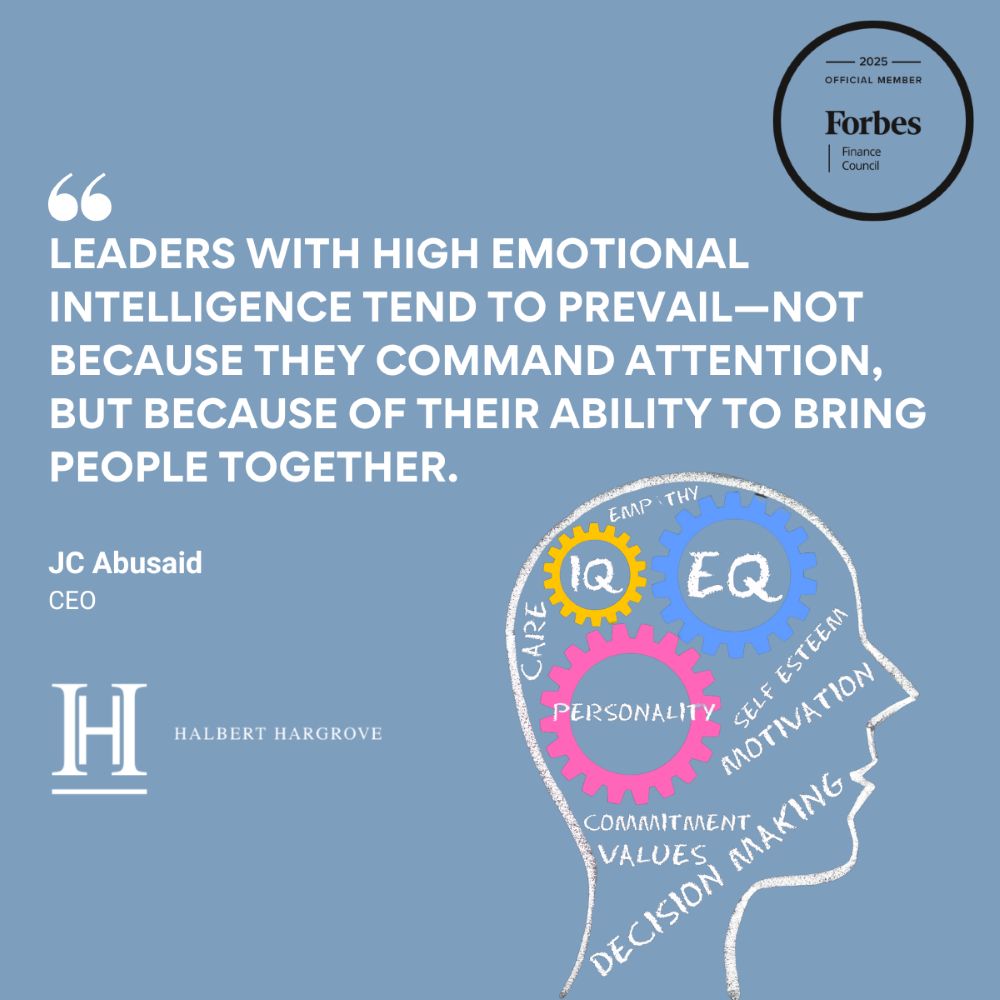By JC Abusaid, CEO/President, featured in Forbes
JC Abusaid is the CEO and President of Halbert Hargrove, a wealth advisory firm headquartered in Long Beach, California.
According to a Harvard Business School study, leaders who master empathy perform over 40% better in coaching, engaging others and decision-making. Emotional intelligence (EQ) is the ability to recognize, understand and deal skillfully with one’s own emotions and the emotions of others.
Daniel Goleman, a psychologist who popularized the concept of emotional intelligence, identified five key elements of EQ for leaders: empathy, effective communication/social skills, self-awareness, self-regulation and motivation. Leaders with high EQ genuinely care for others, going beyond surface-level interactions with their employees to truly address the needs and feelings of their team. They are driven by a passion for helping those around them, understanding how to navigate complex situations delicately and with kindness. EQ-oriented leaders focus on supporting their team and approach leading with selflessness and humility, prioritizing the success of others over personal recognition.
Shaping Team Dynamics
Having a high EQ enables you to effectively gauge team morale and determine how decisions might affect group dynamics. When leaders use their EQ effectively, team members feel involved in decisions and recognize their contributions as meaningful. What might otherwise just be a “job” becomes part of something bigger. Employees can start to see themselves and their work as part of a greater mission.
Because leaders with high EQ typically explain the reasoning behind their decisions, they are more likely to have a high-performing, committed team. Team members who do not understand a leader’s reasoning will not be as effective at achieving goals. By bringing employees into the decision-making process, leaders show team members that he or she respects and values them—that they aren’t replaceable cogs but integral members of the organization. In my experience, that respect will excite more employee loyalty and passion.
Your emotional intelligence can also help you identify issues and resolve challenges. One common challenge you might be familiar with is the push and pull between sales and operations in most organizations. It’s not uncommon for salespeople to receive all the glory and accolades, while the ops people remain mostly invisible. Early in my career, I worked at a firm that kept its operations people hidden away in a dingy, windowless basement. Their offices were miserable and, in turn, the ops people felt extremely undervalued. Morale was terrible, and the turnover was high. And yet, the organization couldn’t function without the operations team.
Because of that experience and my hypersensitive emotional intelligence, I worked hard to break this conflict in my current role. Today, we regularly honor and recognize our operations people alongside our top-performing salespeople. It has taken a lot of work and education, but now our ops team and our top producers work side by side, and the organization is a better place for it. The barriers between these functions are broken, and both teams unite for a shared purpose.
Developing And Strengthening Emotional Intelligence
As leaders, developing and strengthening our emotional intelligence regularly is vital. However, this requires intentional effort and self-awareness. Start by checking your ego and embracing the mindset that leadership is about others, not yourself. Practice active listening to understand different perspectives and evaluate how your decisions and actions affect others.
Cultivating empathy for your employees and caring about their challenges and motivations is key. Support your team through the highs and lows, especially when they make mistakes. In fact, use those mistakes as teachable moments to foster growth and trust.
Seek feedback from peers and mentors to identify your blind spots and regularly reflect on your interactions. If you aren’t already, I suggest regularly surveying your employees on your leadership style. Make the surveys anonymous to ensure you receive honest feedback. If you aren’t sure how to implement the feedback, hire a leadership coach or take a training focused on emotional intelligence. Remaining open to personal growth will help you continually refine your EQ and lead more effectively.
Leaders Speak Last
I believe that a great leader does not love the sound of their own voice—they prefer to listen and adapt alongside their team, providing empathy and a purpose. This is what makes a good communicator.
As CEO, I work hard to prioritize my team’s success over my own, ensuring that everyone is heard and valued. In team meetings, I make it a point to speak last, allowing everyone else to share their ideas and feelings first. This prevents their thoughts or opinions from being influenced by mine.
Another example is when interviewing prospective employees. I often evaluate the questions I ask during interviews, so I don’t tip my hand and sway the team one way or another. This is especially rewarding when junior staff argue for or against a candidate and their point of view is different from mine. This shows me we are fostering innovation, creativity and a sustainable environment and developing associates to think independently.
While my motivations for leading a team are to help elevate others in their careers, it’s important to ask yourself what your motivations are. If you are a leader looking for recognition or in it for the money, it might be more challenging to deepen your emotional intelligence.
Leaders with high EQ tend to prevail—not because they command attention but because of their ability to bring people together. A true leader is someone who understands people and their situations, not just someone who holds a title. Good leaders take the time to listen, assess and respond to their employees in ways that create meaningful outcomes.


